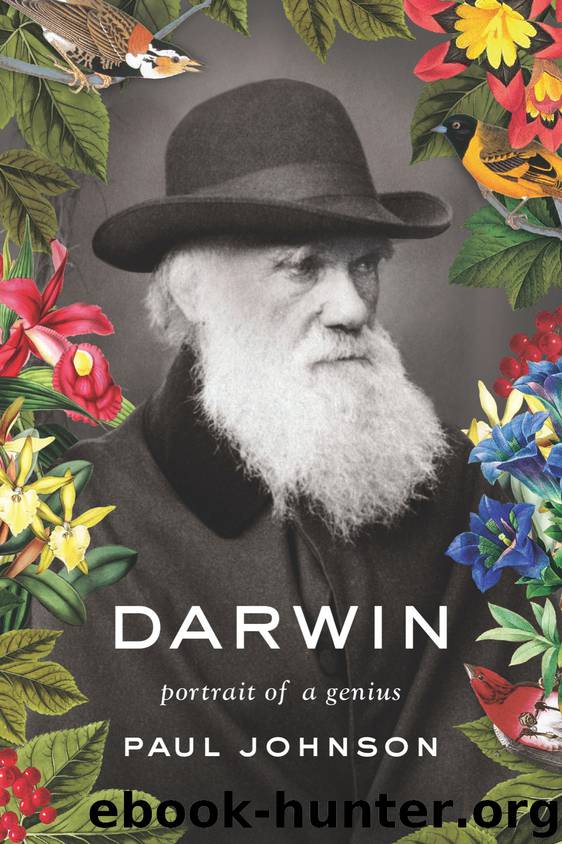Darwin by Paul Johnson

Author:Paul Johnson
Language: eng
Format: epub
Publisher: Penguin Group US
Published: 2012-10-01T04:00:00+00:00
What a struggle between the several kinds of trees must have gone on over long centuries . . . what war between insect and insect—between insects, snails and other animals, with birds and beasts of prey—all striving to increase, and all feeding on each other or on the trees or their seeds and seedlings, or on the other plants which first clothed the grounds and thus checked the growth of the trees!
As a rule, however, the effect is achieved by pitting the text with key words and phrases, all bellicose or militaristic. The word struggle is found on almost every page, sometimes two or three times. The “struggle for existence,” the “race for life,” the “battle for life,” and “great battle for life” crop up continually. We hear again and again of “forces,” “war between insect and insect,” “invasion,” “intruders,” of “foreigners” who are “taking possession of the land,” of plants and animals being “rigidly destroyed,” of constant “attacks,” of species being “beaten” or being “victorious.” The words destroy, extinct, and extermination occur many times. Malthus rears his misleading head repeatedly: his “doctrine” of births proceeding “in geometrical ratio”—a term Darwin uses repeatedly without ever explaining what he means by it or how he justifies employing it. All he says is that “it applies with manifest truth to the whole animal and vegetable kingdom.” He terrifies the reader with a vision of “fifteen million elephants” suddenly appearing if these creatures—whom he picks as the slowest in procreating—are allowed to do so unchecked, and he has further catastrophic visions of the earth so crowded with animals that none could move. Hence the need for continual and colossal killings.
As it happens, Darwin, displaying the ambiguity that was one of his most marked characteristics, quails before the bloodthirsty visions he conjures up and tries to comfort the terrified reader by softening them in such a way as to refute much of what he has just said. Thus at one point, he suddenly states that climate, rather than war within or between species, is by far the greatest check on numbers, thus shoving the battle scenario offstage. At another, he abruptly announces that “natural selection will always act very slowly, often only at long intervals of time, and generally on only a very few of the inhabitants of the same region at the same time.” This is a very different picture from the incessant struggle that he portrays elsewhere, which forms the general impression left with the reader. The truth, of course, is that the fossil record gives no evidence of struggle, and Darwin’s next sentence shows why he introduced the qualification: “This very slow, intermittent action of natural selection accords perfectly well with what geology tells us of the rate and manner at which the inhabitants of this world have changed.”
These qualifications produced a visual image of natural selection that accorded much more closely with the detailed evidence of its operation among both vegetable and animal life. But it was a much less exciting one.
Download
This site does not store any files on its server. We only index and link to content provided by other sites. Please contact the content providers to delete copyright contents if any and email us, we'll remove relevant links or contents immediately.
Sapiens: A Brief History of Humankind by Yuval Noah Harari(14355)
Sapiens by Yuval Noah Harari(5357)
Pale Blue Dot by Carl Sagan(4990)
Homo Deus: A Brief History of Tomorrow by Yuval Noah Harari(4893)
Livewired by David Eagleman(3757)
Origin Story: A Big History of Everything by David Christian(3679)
Brief Answers to the Big Questions by Stephen Hawking(3416)
Inferior by Angela Saini(3308)
Origin Story by David Christian(3191)
Signature in the Cell: DNA and the Evidence for Intelligent Design by Stephen C. Meyer(3122)
The Gene: An Intimate History by Siddhartha Mukherjee(3087)
The Evolution of Beauty by Richard O. Prum(2978)
Aliens by Jim Al-Khalili(2822)
How The Mind Works by Steven Pinker(2809)
A Short History of Nearly Everything by Bryson Bill(2679)
Sex at Dawn: The Prehistoric Origins of Modern Sexuality by Ryan Christopher(2509)
From Bacteria to Bach and Back by Daniel C. Dennett(2474)
Endless Forms Most Beautiful by Sean B. Carroll(2466)
Who We Are and How We Got Here by David Reich(2424)
